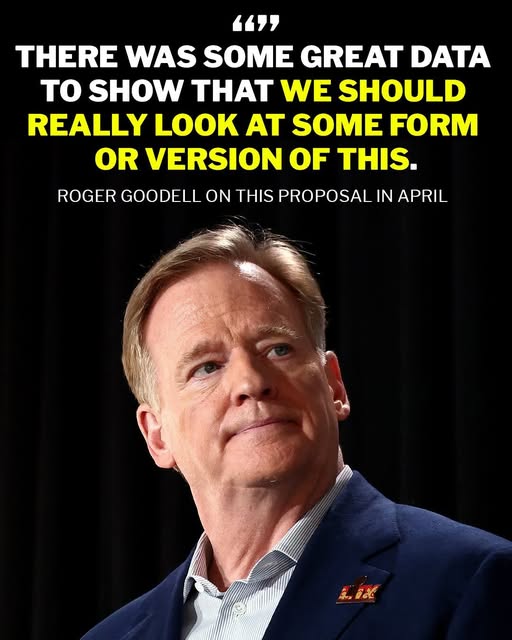The NFL, long celebrated for its balance of tradition and innovation, is poised to make one of its most drastic postseason changes in decades. According to multiple sources close to league discussions, the NFL playoff format is expected to undergo a significant overhaul that could alter not only the number of teams involved but also the way games are seeded, scheduled, and possibly even hosted. While details are still being finalized, the shift is expected to be wide-ranging and far-reaching—affecting fans, franchises, television networks, and the players themselves in profound ways.
For years, the NFL’s playoff structure has walked a fine line between exclusivity and inclusion. The current system, implemented in 2020, expanded the postseason to 14 teams, with seven from each conference, and granted only the top seed in each conference a first-round bye. It was a historic move that generated added interest and revenue. Yet in true NFL fashion, what was once seen as a bold change is now being reconsidered for even greater impact. The league, always eyeing opportunities for growth in both entertainment and revenue, is now weighing proposals that could take the playoff system to a new, unprecedented level.
One of the most radical elements under consideration is expanding the postseason field once again—this time to 16 teams. This would mean eight teams per conference make the playoffs, and critically, no team would receive a bye. All participating teams would compete during the opening Wild Card weekend, resulting in four first-round games per conference and creating an action-packed slate akin to March Madness in the NFL’s traditionally slower January landscape. The “no-bye” format would ensure that all playoff contenders are treated equally in terms of rest and preparation, potentially leveling the playing field but also removing a key incentive for earning the No. 1 seed.
This potential change has already sparked fierce debate among coaches, players, and analysts. Supporters argue that adding more teams increases excitement, keeps more fan bases engaged deeper into the regular season, and creates more high-stakes games for national television. With the NFL’s media rights deals with Amazon, ESPN, Fox, CBS, and NBC worth billions of dollars, adding more playoff games—each likely to draw massive viewership—makes financial sense. Critics, however, worry about the dilution of the postseason product. They argue that expanding the playoffs further would allow mediocre teams to sneak into the dance, lessening the overall quality of matchups and undermining the importance of the regular season.
The quality versus quantity debate is a familiar one in sports, and nowhere is that tension more apparent than in the NFL, where each game carries immense weight. A 17-game regular season already demands physical and mental fortitude, and adding another layer of potential games raises concerns about player health and safety. While the NFL Players Association has not formally objected to the possibility of a 16-team playoff, some players have privately voiced concerns about the growing demands of an already grueling season. More games mean more wear and tear on bodies, especially for teams making deep postseason runs.
Another significant facet of the rumored playoff overhaul involves reseeding teams after each round. Under the current format, the league maintains a traditional bracket, where the highest remaining seed always faces the lowest remaining seed in subsequent rounds. The proposed changes could introduce a more fluid reseeding process that takes into account additional variables—such as regular-season performance metrics beyond win-loss records, travel schedules, and even television ratings potential. While reseeding is not a foreign concept in other sports, implementing it in the NFL would represent a bold departure from long-standing norms and create a new layer of strategic planning for teams.
Additionally, the NFL is considering changes to the hosting rules for playoff games. Currently, the higher-seeded team hosts, but there’s discussion about introducing neutral-site games for some rounds, particularly the conference championships. The league tested this concept by proposing a neutral-site AFC Championship Game in 2022, contingent on certain final-week outcomes. Although that game ultimately wasn’t needed, the idea resonated with some league executives, who view it as a way to create Super Bowl-like atmospheres earlier in the postseason. This move would allow the NFL to showcase its biggest games in major markets, indoor stadiums, or even international venues, further expanding its global footprint.
While neutral-site games would likely be lucrative and logistically convenient for television partners, they would eliminate one of the most sacred traditions in football: the home-field advantage earned through a season of hard-fought victories. Fans of top seeds who’ve historically expected playoff games at their stadiums may be disheartened by the potential loss of that privilege. From the raucous crowd noise in Kansas City to the frozen tundra of Green Bay, playoff environments have become an indelible part of NFL lore. Removing those from the equation would alter the sport’s culture in meaningful ways.
Also under discussion are potential changes to the schedule itself. To accommodate additional games, the NFL may push the Super Bowl back another week, extending the season further into February. This would give the league even more dominance over the sports calendar, but could also lead to clashes with other major events, including the Winter Olympics in select years. However, with the NFL’s unmatched ratings dominance, there’s confidence within the league office that such conflicts would be manageable—or that other events would blink first.
A notable aspect of these deliberations is the influence of legalized sports betting. The NFL has embraced gambling in recent years, forging partnerships with sportsbooks and allowing betting lounges in stadiums. Expanding the playoffs creates more betting opportunities, more content for fantasy leagues, and more reasons for fans to stay engaged. Every added playoff game is not just a revenue generator through ticket sales or TV rights—it’s a betting bonanza that fits neatly into the league’s evolving business model.
Some insiders believe the push for playoff expansion is also a preemptive move in anticipation of future league expansion. The NFL has flirted with the idea of adding new franchises, possibly internationally, with London and even Mexico City floated as potential homes. A 36- or 40-team league would demand a broader postseason framework. By laying the groundwork now, the NFL can future-proof its most profitable time of year while also preparing for a new era of franchise growth.
However, not all changes may happen at once. There is speculation that the league will roll out adjustments in phases to test fan reactions and logistical feasibility. For example, the NFL might first expand to 16 playoff teams without altering seeding rules or hosting procedures. If successful, the league could then introduce neutral-site games or reseeding in future years. Incremental change has long been the NFL’s style—measured enough to protect its image, yet bold enough to stay ahead of the curve.
Fan reaction to the leaked proposals has been mixed. Some welcome the changes as part of the NFL’s evolution and believe more playoff games will mean more thrilling moments, Cinderella stories, and unforgettable finishes. Others feel the league risks losing the specialness of the postseason by trying to fix something that isn’t broken. The phrase “If it ain’t broke, don’t fix it” has echoed throughout social media, especially from traditionalist fanbases.
Commissioner Roger Goodell, known for his focus on revenue growth and global branding, is reportedly a strong advocate for some version of these changes. Under his leadership, the NFL has already implemented a 17-game regular season, moved games to Europe, and allowed streaming platforms to become central players in broadcasting rights. A revamped playoff system fits squarely within his vision for a bigger, broader, and more commercially dominant NFL.
Ultimately, the league’s owners will have the final say, and any change will require approval by three-fourths of the 32 franchises. That vote could come as soon as the NFL’s next owners’ meeting. If passed, fans could see the new format in place as early as the 2026 season, though some insiders say the league may wait until the 2027 season, giving teams, venues, and networks ample time to adjust.
Whether you view the rumored playoff expansion as progress or peril, one thing is certain: the NFL is not content to stand still. As America’s most powerful sports league, it continues to reshape the landscape of professional athletics with every decision. What began as a 12-team playoff system in 1990 may soon become an even bigger, more complex, and more controversial postseason spectacle. And for better or worse, it will keep the NFL exactly where it wants to be—at the center of the American sports universe.



